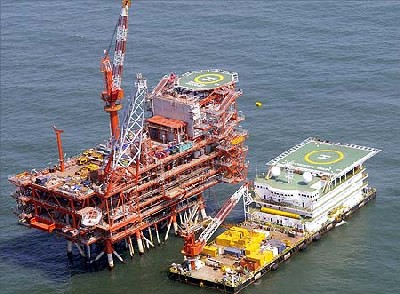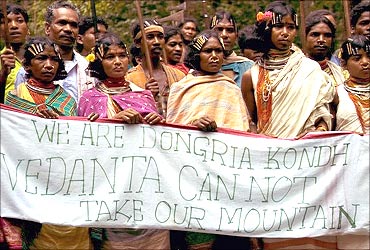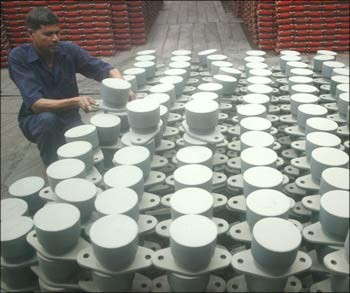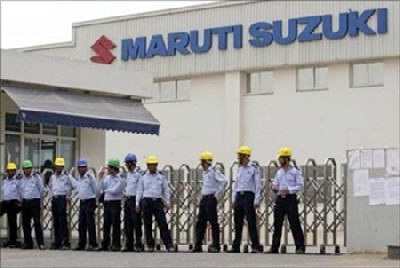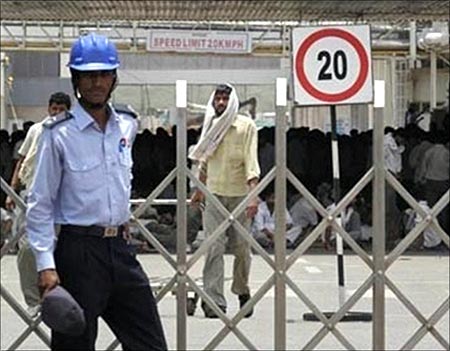 | « Back to article | Print this article |
Why companies increasingly opt for arbitration
When political or policy climes shift, companies who have contracts with the government can find themselves in a pickle, where the only recourse is a negotiated settlement.
How does a company dispute an interpretation of a contract that adversely hits its business, when one of the contracting parties has sovereign powers? Sometimes, it becomes the equivalent of snapping at the hand that feeds you.
This is the sort of dilemma -- a relatively new one -- that companies are increasingly encountering in the post-liberalisation era.
If the government's insistence on Cairn India withdrawing arbitration proceedings is proof of a government choosing to call the shots as a sovereign power instead of a being a mere contracting authority, then Reliance Industries' decision to slap an arbitration notice on the government can be viewed as corporate India's increasing tendency to invoke contract clauses that try to counteract adverse policy or political shifts from when the contracts were first inked.
Click NEXT to read more...
Why companies increasingly opt for arbitration
What could prompt a company, which survives on government decisions and goodwill of its officers at many stages of its business, to become a disputant? "Companies ideally like to resolve issues across the table through discussions but this requires decisions to be taken by the government and that does not happen often," says a person who is closely associated with one of the high-profile arbitration cases with the UPA government that has now landed in the courts.
Arun Chawla, assistant secretary general, FICCI, is also of the view that often government representatives do not want to invite criticism by having to take decisions that require interpretation. In such cases they find it much easier to have the final call be taken through an arbitration process.
Harish Salve, former Solicitor General of India, however, dismisses the suggestion of a change in policy environment being the central reason for arbitration cases. He sees the disputes between the government and private companies as being similar to ones between any two private contracting parties. "This is not something which is peculiar to India. It is new because we have just started having public-private partnerships," he adds.
Click NEXT to read more...
Why companies increasingly opt for arbitration
Of course, policy-making precedes the signing of any agreement between the government and private companies and so policies as such shouldn't be the focus of disputes.
Salve, who has represented the government and private companies in many arbitration cases, says that contracts, like say the production sharing contracts for oil and gas blocks, do not lay down any policy dimension since they merely crystallise the rights of the concerned parties.
When the government enters into a contractual domain, it is not covered by any special law but by the Indian Contract Act just like any contract between two private parties. The only difference is that while the contracting parties remain the same in the case of non-government contracts, in the case of the government, the political forces governing these pacts could swing a corporate's stakes.
Courts in India also influence which cases go to arbitration. Clauses on arbitration are essentially part of any contract and courts do not entertain disputes where arbitration is available as an option.
Click NEXT to read more...
Why companies increasingly opt for arbitration
"Courts in a number of cases have thrown out cases where arbitration was possible and have given directions asking companies not to be litigation happy," says Chawla, who oversees the FICCI Arbitration and Conciliation Tribunal that encourages companies to go in for arbitration.
The FICCI panel also offers a panel of arbitrators to the disputing parties. One of the primary reasons for promoting arbitration is to avoid dependency on courts. "It is in the interest of the company to opt for arbitration otherwise business suffers especially if the court grants a stay on certain activity," he says.
Naturally, arbitration being a private remedy is not open to the public viewing unlike court proceedings where a close scrutiny is possible. While Salve defends the rules of secrecy governing the arbitration process, Chawla points out that this could in fact be advantageous when companies want to avoid publicity in sensitive cases. Although it may raise questions of transparency.
The big question though, is what happens when tightly negotiated contracts that have the seal of Cabinet approval, like PSCs in the petroleum sector as well as shareholder agreements for buyout of government companies, come to arbitrators. Are the conflicting parties on equal footing?
Ideally, they should but that's not always the situation. Here's a look at four cases in recent history when corporates and governments locked horns and were forced to come to the arbitration table to try and resolve the case.
Click NEXT to read more...
Why companies increasingly opt for arbitration
Taking the arbitration route
Dispute at KG-D6 asks for arbitrators - Mukesh Ambani
The country's biggest private sector petroleum company, Reliance Industries Ltd (RIL) on November 28 sent an arbitration notice to the ministry of petroleum and natural gas in order to pre-empt a possible government move to disallow some of the expenditure incurred in the KG-D6 gas field in view of falling natural gas production. (RIL facilities are designed to handle 80 million cubic metre of gas a day , but the fields are producing just about 41 mmcmd.)
Cost recovery allows a company to deduct its costs of production before sharing it with the government. Higher the cost recovery, lower the profit shared. In the arbitration notice, RIL stated that the move to limit the amount of expenditure the company can recoup from its flagging KG-D6 fields is illegal and outside the Production Sharing Contract (PSC).
RIL had earlier envisaged a gas output of 80 mmcmd by 2012 from an investment of $8.8 billion of which $5.8 billion has been invested. RIL says the move was prompted by its intention to get clarity on what will be the allowable costs before it puts in more money.
Mukesh Ambani's Reliance Industries issued the government with an arbitration notice recently.
Click NEXT to read more...
Why companies increasingly opt for arbitration
A call option that went unanswered - Anil Agarwal
The strategic sale of 51 per cent government equity in Bharat Aluminum Company for Rs 550 crore to Sterlite Industries Ltd, now part of Anil Agarwal -- controlled Vedanta Resources, came with a call option clause -- where the buyer has the option to buy the remaining government equity in the company at a future date and price.
When Sterlite decided to call for government shares in 2004, three years after the sale was completed, the Congress-led United Progressive Alliance (UPA) had replaced the BJP-led National Democratic Alliance at the Centre. Since Balco disinvestment had come in for severe criticism and the new government had given up the policy of strategic sale, the government did not reciprocate with the "put" option.
It cited Section 111A of the Companies Act which said that the shares of a company are freely transferable -- in other words, the government cannot be forced to sell its remaining stake to the company.
Click NEXT to read more...
Why companies increasingly opt for arbitration
In 2007, when the company went to court against the government decision, the court held that since the dispute arose out of the shareholder agreement, it should be resolved through arbitration prescribed in the agreement.
Earlier this year, while rejecting the Sterlite plea, the arbitration award held that the law of the land comes first, followed by the articles of association of a company and only then the mutual contract between two partners.
The dispute has not ended though with both the government and Sterlite deciding to approach the Delhi high court -- the former on the valuation of shares whenever the government decides to go for sale, and the latter for its claims on the call option being rejected.
Click NEXT to read more...
Why companies increasingly opt for arbitration
Cairn's cess dispute withdrawn - Anil Agarwal
Cairn became a party of a production sharing contract for an oil block in Barmer district of Rajasthan by replacing Shell India. Government-controlled Oil and Natural Gas Corporation(ONGC) is the other partner in the PSC that had been signed with the Union government.
When the Mangala field in the Barmer block started production, Cairn, through a notice in September 2009, invoked arbitration against the Union government and ONGC on payment of cess -- a levy paid on oil production at the rate of Rs 2,650 per tonne.
The company asked that it be exempted from payment of cess though it started paying the amount under protest pending arbitration proceedings in London. The company has now withdrawn the proceedings since a government clearance for Vedanta's takeover of Cairn India came with a condition that the existing arbitration case be withdrawn.
It had earlier filed for arbitration with the government on the base development cost for Ravva field off the Andhra Pradesh coast—a case that eventually went against the government in January of this year which is when the final verdict was issued.
When Anil Agarwal's Vedanta wanted to acquire Cairn India, the company was forced to withdraw arbitration case.
Click NEXT to read more...
Why companies increasingly opt for arbitration
Driver's seat: Your man versus His man - Osamu Suzuki
When in August 1997, the Union government appointed RSSLN Bhaskarudu as the managing director of Maruti Udyog Ltd, Suzuki Motors, the government's 50 per cent partner in the company opposed the appointment.
In a press release, Osamu Suzuki, SMC president, claimed that the appointment was illegal since five directors who comprised the majority on the board of nine had objected to the appointment.
The government argued that according to a 1992 amendment in the joint venture agreement both the partners could nominate the managing director for five years in turns and there was no need for consultation on the appointment. In an AGM held on September 22, 1997, when Bhaskarudu's appointment was put to vote, there was a tie. Prabir Sengupta, chairman of the MUL board, used his casting vote to ratify the appointment.
Click NEXT to read more...
Why companies increasingly opt for arbitration
Following this, SMC nominees passed a no- confidence motion against Sengupta and proposed the name of Yoshio Saito for the chairmanship. SMC then lodged an arbitration petition against Bhaskarudu's appointment in the International Court of Arbitration.
In June 1998, the Bharatiya Janata Party government intervened and arranged for an out-of-court settlement between the parties under which Bhaskarudu was to step down in December 1999, two years ahead of schedule and Jagdish Khattar, a SMC nominee was to replace him in January 2000. Additionally, Saito was to replace Sengupta as the chairman.
Osamu Suzuki, president of Suzuki Motor's opposition to the Indian government's choice of MD for Maruti Udyog resulted in an arbitration.




